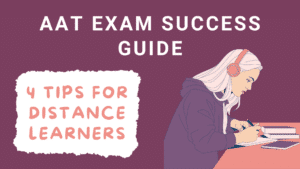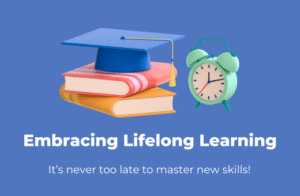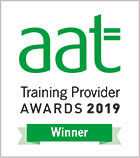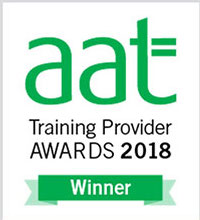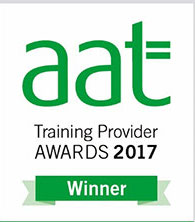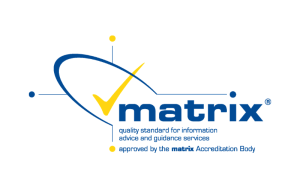Almost everyone who has studied their accounting qualification will tell you that if you work and study at the same time, it can be tough to stay motivated and keep on track without stress.
Emma has first-hand experience with trying to balance studies and a full time job, and she wants to share her story to help other students stay on track and keep motivated!
Emma’s Story:
I will be the first to admit that I do not consider myself to be academically gifted and I’ve had to work hard to achieve my accounting qualifications. I left school not very interested in learning and had no ambitions to go to University. I drifted through my sixth form college and left without much to show for those two years. Music had been my passion at school, and playing in the youth orchestras but I was never too keen on learning the theory and practicing my scales!
Fast forward a couple of years and I’m in an Admin Finance role at Exeter City Council. After a further 3 years of processing supplier invoices for payment and inputting journals, I was starting to get bored and realised I wanted to progress my career. I asked if I could start studying for AAT at the local college, which was agreed.
The first year of the course, I attended evening classes twice a week. Once again, as much as I wanted to progress, I couldn’t get my head around putting in the hours to achieve this and I failed my first exam. In those days, it was one paper exam at the end of the year with three sections to it and you had to pass all three elements to pass overall. I failed the section on double entry bookkeeping – not a good start! However, my manager was very supportive and allowed me to continue with the course. Thank goodness. It was then that I had my lightbulb moment and realised I would need to put in the hours if I was going to achieve this qualification and become MAAT.
I was also promoted to an Assistant Accountant role at work as it became vacant. Two years, and a lot of hard work later, I did it! The hard work had paid off – all those weekends of study, of tears and tantrums when something didn’t balance, not understanding the question ‘because it wasn’t worded very well’ – it was worth it to have those letters and I know I had earned them. And when I finished, I was adamant I was never going to study again. Ever!
The Journey Didn’t End There…
Three short years later, I was missing studying (who knew?!) and again I started thinking about my future and knew I wanted to become a fully qualified Accountant. Working in Local Government, the CIPFA (Chartered Institute of Public Finance & Accountancy) qualification was the natural path for me. However, (due to another back-story I won’t bore you with, dear reader), I had to start studying this qualification via distance learning.
I knew this was going to be a big step up from my AAT studies and I needed to pace myself. I studied one module at time. I was really excited to be starting something new again and the potential prospects it could bring. I went out and brought lots of new stationery! I also put together a study timetable, working backwards from the date of the exam (no moving dates in those days!), allowing a couple of weeks for revision and back from there. Our textbooks provided a guideline of how many hours each study session should take, usually between 4 – 6 hours each, and this was how I was going to spend my weekends from now on. A session each on Saturday and Sunday mornings. Exams took place in June and November. I carried on with this steady routine for the following few modules as it worked for me.
Part way through my second year, I hit a real mental block with one module and it took me three attempts to pass. This equated to taking 18 months to complete this module due to having to wait until the next available exam sitting each time. This was a real low point for me and I started to question whether I wanted to continue with the course. Then I thought about how far I hadcome and how much I only had left to do and this truly spurred me on.
My employer also agreed for me to start attending college now – the final modules of this Masters Level qualification demanded it. I was still studying what felt like all hours, travelling toLondon every other week for lectures, and working full-time! I will admit to being quite exhausted by the end. It was tiring trying to study in the evenings after a long day at work, but needs must as it felt like there simply weren’t enough hours in the day to study just at the weekends any more.
But again, the hard work paid off and I finally achieved my well-earned CPFA letters. Eight years after I started! I will admit that during the last couple of years of my studies, I had no work/lifebalance to speak of. I put aside my social life, except for special occasions, so that I could focus on achieving my qualification. But it was definitely worth it.
I had a second promotion at work during this time, to Systems Accountant, to work on the implementation of a new General Ledger system. During the time of implementation I had to put my studies on hold as this would now take up all my time, including a lot of evenings and weekends.
From this role, my love of training grew and developed. I was the lead on training all our end-users on this new system; I created all the training manuals and ran the training sessions, sharing this responsibility with two colleagues on the project team. I made this training role my own over the years, expanding it to cover training on the other finance systems, and VAT.
In 2013, I completed the level-entry teacher training course for teaching post-16 education, to help me improve my role at the Council, and the rest is history!
Over the last 12 months, however, this tutor became the student once again! I was interested in learning something new, just for fun, and I’ve recently completed my GCSE Psychology studies. I followed the same structure to my studies that had helped me in the past:
- I knew when my exam dates were so this was my starting point.
- My college advised me how many hours a week I should be putting towards my studies – I had enrolled on the course nice and early so it was only around 4 hrs a week – bliss!
- I followed the structure of the learning materials, and put together my timetable. It equated to one or two chapters a week, and I also had progress tests to submit to my tutor after every 3 or 4 chapters.
- I set out my study space and put this timetable on my wall, in front of my desk, ready for me to tick off each session as I competed it.
- This was very satisfying! Marking my progress and seeing how much I had done to date, and how much I had left to do.
- I also planned in various occasions when I knew my study was going to be interrupted, such as birthdays, Christmas and other pre-planned social events.
- I also built in some additional slack for other, unexpected events.
- When I did sit down to study, the radio was switched off as was my phone. I need to study in silence and be free from distractions.
One of the great advantages of studying via distance learning is the flexibility it provides and I know this is a big draw for a lot of students, myself included. However, it can be very easy to become side-tracked and fall behind. Yes, there will always be times when you don’t feel like studying – and I wouldn’t recommend pushing yourself when you’re really tired after a long day at work – but it does take some self-discipline, and organisation, to make sure that you stay on track.
If you do begin to struggle, remind yourself why you started the course in the first place – was it to work your way up the career ladder? Are you stuck in a rut and looking for a change of career? Whatever your reason, it will be personal to you and you should use this to spur you on.
Use the Individual Learning Plan (ILP) that we provide you with to help you structure your studies and put a timetable together. These are based on a study program of 6-8 hours a week but we all work at different speeds. If you are struggling to meet your deadlines then please do talk to your tutors, we all want you to be a success and pass your exams and we are here to support you. We all have our own ways and methods of studying – some people prefer the evenings, others the weekend. You will find a way that suits you too.Oh, and in case you’re wondering, I achieved a Grade A for my GCSE!
We hope that these study tips have helped you! Whilst we are not able to respond to any specific questions you might have about our posts, do please let us know if there are any further topics you would like us to write about. If, however, you are one of our tutor supported students, please get in touch with your personal tutor who will be more than happy to help you.







